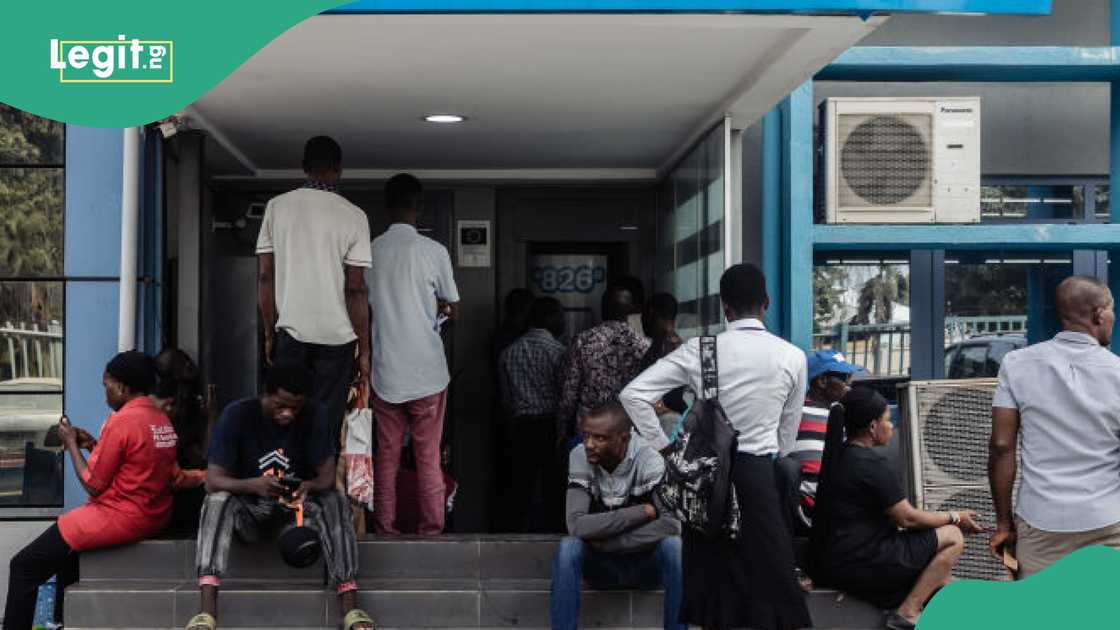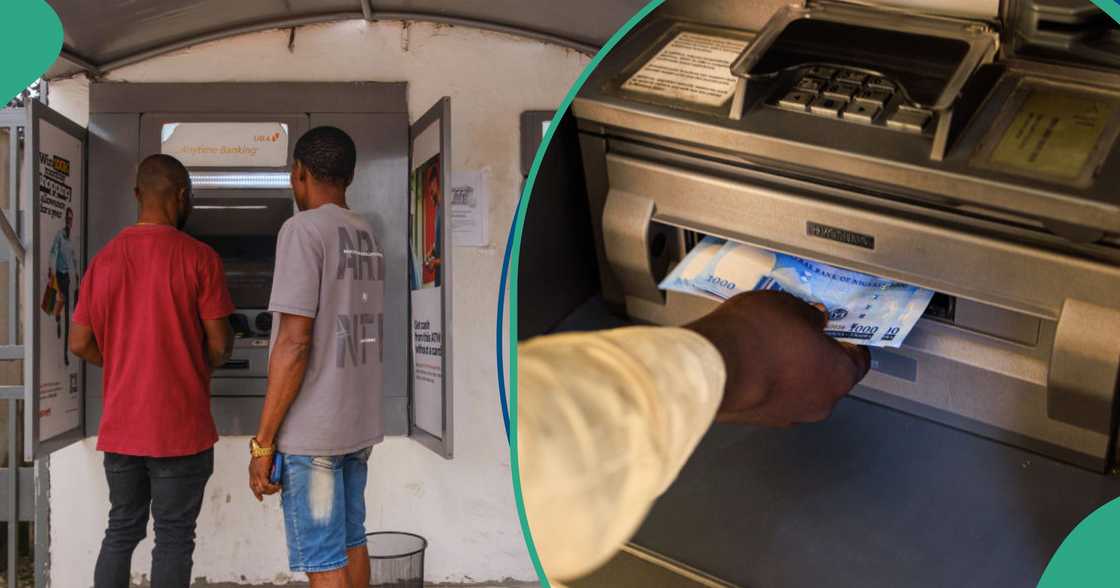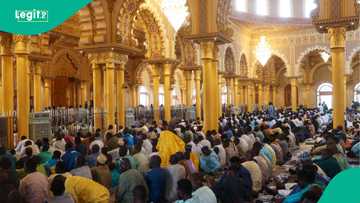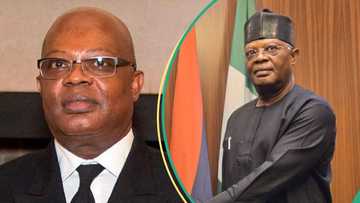Access, FirstBank, GTB, UBA, Zenith, Others to Close Branches Nationwide for 2 days
- Commercial banks are expected to join others in closing their branches across the country on Monday and Tuesday
- This is to comply with the public holiday announced by the federal government to mark the Eid-el-Fitr celebration, otherwise known as the Sallah festival
- Bank customers are now directed to make use of other electronic banking channels to carry out their transactions
CHECK OUT: Education is Your Right! Don’t Let Social Norms Hold You Back. Learn Online with LEGIT. Enroll Now!
Legit.ng journalist Dave Ibemere has over a decade of business journalism experience with in-depth knowledge of the Nigerian economy, stocks, and general market trends.
Commercial banks and other financial institutions in Nigeria will be closed on Monday, March 31, and Tuesday, April 1, 2025.
This is in observance of the Eid-el-Fitr public holidays, as directed by the federal government.

Source: Getty Images
Bank workers to observe public holiday
Legit.ng previously reported that Olubunmi Tunji-Ojo, the minister of Interior, announced the Eid-el-Fitr celebration, also known as the Sallah festival, on behalf of the federal government.
The holiday is a cherished occasion observed by millions of Muslims and others worldwide following the Ramadan fast.
In a statement released on Wednesday by the Ministry of Interior’s Permanent Secretary, Magdalene Ajani, the minister congratulated the Muslim Ummah on the successful completion of the 30-day Ramadan fast.
He highlighted the significance of the holy month in fostering self-discipline, compassion, and spiritual renewal.
Tunji-Ojo urged Muslims to continue embodying the virtues of love, generosity, and peace, emphasising the importance of national unity and religious harmony.
He also called on Nigerians to use the festive period to pray for the country's peace, stability, and prosperity.
The minister stated:
“As we celebrate Eid-el-Fitr, let us reflect on the lessons of Ramadan, embrace one another with love and forgiveness, and work together to build a more united and prosperous Nigeria."
He further encouraged citizens to celebrate safely and responsibly while extending acts of kindness to the less privileged, in line with the values of Ramadan and Eid.

Read also
Ramadan: Wike shows love to people with disabilities, other communities, donates 10,000 bags of rice
On behalf of the federal government, Tunji-Ojo wished all Muslim faithful a joyous Eid Mubarak and prayed that the blessings of the season bring happiness and fulfillment to everyone.

Source: Getty Images
Bank customers to use e-banking
Bank customers are expected to use electronic banking services on Monday and Tuesday during the holiday period.
The major types of e-banking include online Internet banking, mobile banking, USSD, and Automated Teller Machines (ATMs).
The CBN has been advocating for increased availability of cash at ATMs. Many Nigerians have complained about the challenges of accessing cash from ATMs.
As an incentive to banks, the CBN recently raised withdrawal charges to N100.
The holiday period will highlight the importance of the use of e-transactions.
Broader economic implications of bank closures
The two-day Eid-el-Fitr bank closure has broader implications for the Nigerian economy, especially for businesses and individuals reliant on traditional banking.
Cash-dependent small businesses may experience reduced transactions, while delays in clearing checks and processing bulk payments could disrupt corporate operations.
The informal sector, heavily reliant on cash transactions, might face liquidity challenges, which would force many to rely on Point of Sale (PoS) operators.
In addition, financial market activities, including forex transactions, will temporarily slow down.
Even though the rise of digital banking and fintech solutions helps mitigate these disruptions, still, the closure underscores the need for a more resilient financial system that ensures uninterrupted transactions during public holidays.
Alternative banking options customers can explore
The two-day Eid-el-Fitr holiday means a temporary closure of bank branches across Nigeria, which could disrupt financial transactions for many customers.
However, Nigerian bank customers have several alternative banking options to ensure seamless transactions during the break.
One of the most convenient options is mobile banking apps, which allow users to transfer funds, pay bills, and even request loans instantly. Most commercial banks in Nigeria have robust mobile apps that provide 24/7 banking services.
Also, USSD banking is a reliable alternative, especially for those without internet access. By dialing specific bank codes, customers can transfer money, check balances, and buy airtime with ease.
ATMs remain a critical option for cash withdrawals and some basic banking functions. However, customers should ensure they withdraw cash in advance, as some machines may run out of cash due to increased demand during the holidays.
Another option is agency banking, commonly known as POS services, which has become widespread in Nigeria. POS agents provide essential banking services such as cash withdrawals, deposits, and transfers.
Finally, fintech platforms like Opay, PalmPay, and Kuda offer digital banking solutions that can help users complete transactions without visiting a physical bank. These options ensure financial continuity despite the holiday closure.
PoS operators announce new withdrawal charges
Earlier, Legit.ng reported that PoS operators hiked charges to over 100% following persistent cash scarcity.
Checks showed that the PoS operators, which served as a last resort for cash-strapped Nigerians, increased their fees to N300 for every N10,000 withdrawal instead of the N200 they previously charged.
The situation is worse in some states, especially in Lagos, where most ATMs are dry, or customers form long queues to withdraw.
This article has been updated by head of business desk, Victor Enengedi, with additional informaton.
PAY ATTENTION: Сheck out news that is picked exactly for YOU ➡️ find the “Recommended for you” block on the home page and enjoy!
Proofreading by Kola Muhammed, copy editor at Legit.ng.
Source: Legit.ng

Dave Ibemere (Senior Business Editor) Dave Ibemere is a senior business editor at Legit.ng. He is a financial journalist with over a decade of experience in print and online media. He also holds a Master's degree from the University of Lagos. He is a member of the African Academy for Open-Source Investigation (AAOSI), the Nigerian Institute of Public Relations and other media think tank groups. He previously worked with The Guardian, BusinessDay, and headed the business desk at Ripples Nigeria. Email: dave.ibemere@corp.legit.ng.

Kola Muhammed (Copyeditor) Kola Muhammed is an experienced editor and content strategist who has overseen content and public relations strategies for some of the biggest (media) brands in Sub-Saharan Africa. He has over 10 years of experience in writing and (copy)editing.





